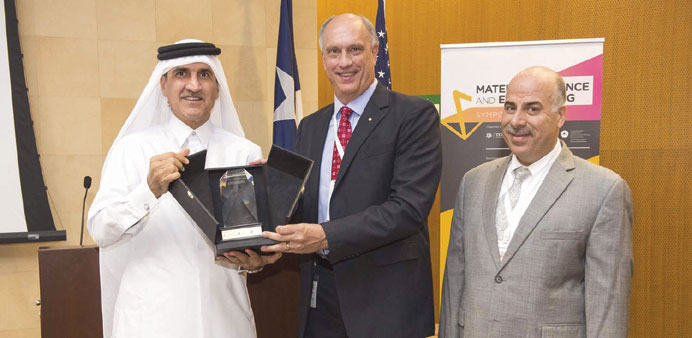Texas A&M University at Qatar ( TAMU-Q) hosted the sixth edition of the Materials Science and Engineering Symposium recently.
The event brought together experts from academic institutions, research centres, industry and government organisations, to discuss the latest advances in materials science and engineering. The theme of this year’s symposium was, “Building Capacity, Knowledge Transfer and Education in Materials Science and Engineering.” The event was co-organised by Qatar University, Qatar Environment and Energy Research Institute (QEERI) as well as Texas A&M at Qatar, and was supported through generous sponsorship from Qatar Petrochemical Company (Qapco).
Dr Mark H Weichold, dean and CEO, TAMU-Q, said: “Texas A&M at Qatar is proud to partner with academic and industry collaborators such as Qatar University, Qapco and QEERI to help realise sustainable solutions to real-world challenges, and to encourage the exchange of knowledge, ideas and expertise that is essential to fuel innovation and new thinking. This year’s symposium illustrates the importance of industry, academic and government partnerships in developing scientific solutions that have direct impact on the world around us.”
Dr Mohamed Yousef al-Mulla, vice chairman and CEO of Qapco, described sponsoring the symposium as an honour and noted how important the potential benefits of innovation were and how it would impact the next generation of materials. Al-Mulla said: “Our modern society is heavily dependent on advanced materials: lightweight composites for faster vehicles, optical fibres for telecommunications and silicon microchips for the information revolution and of course many polymer related applications. The fascinating element about materials science, is that the outcome of research projects are tangible, and they directly impact our lives.”
The symposium, featured speakers from top international academic institutions, QEERI, Qatar University, Texas A&M at Qatar and industry, and served as a platform to foster inter-disciplinary future collaborations among the participants. The programme also featured a poster session, which included a competition of separate tracks for students and researchers, with first-place winners from each track receiving QR5,000 and second-place winners from each track receiving QR3,000.
Students and researchers presented the outcomes of their
research and impact on advancing the industry in Qatar.

Dr Mark H Weichold presents a memento to Dr Mohamed Yousef al-Mulla.
